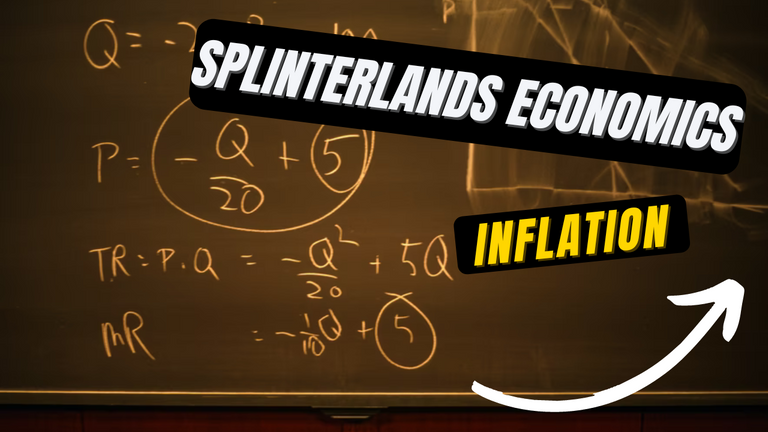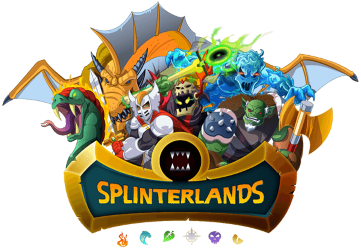Splinterlands Economics: Inflation
Hello everyone! We are back again today with another edition of Splinterland Economics - a series in which we introduce a basic economic concept and then apply it to Splinterlands. If this is your first time reading, just to tell you a little bit about myself: my day job is in an unrelated area but I consider myself a little bit of economics nerd - I read a little (or maybe way, way) more news than I should, double majored in econ, and am obsessed with optimization. I love the way Splinterlands is equal parts card game and resource allocation game. My goal with these articles is to share a little bit of what I know with you all.
Our subject today is one which you may have seen plenty of headlines about recently. In addition to becoming a common talking point as of late, it also describes what happens to the amounts that we pay for goods and services and has enormous macroeconomic and policy implications. Today, we'll be discussing inflation!

What is inflation?

Inflation is a measure of the rate at which a currency loses purchasing power over time, and is often measured in the amount that prices of particular goods increase over time. As an example, if you notice that the price of a hamburger at your favorite fast food restaurant is significantly higher now than that same hamburger cost when you were a kid, then that price increase is due to inflation. If you have heard of the Consumer Price Index, or CPI, it is the weighted average of the price of a particular set of goods which is often used as a general benchmark of inflation.
I am going to focus today mostly on what inflation is and how it impacts us, because diving into a deeper discussion on the causes and policy aspects of inflation could easily fill an entire book and are of limited practical use to us today. However, I should note that there are a couple of important points to keep in mind from the macro/policy perspective in order to understand the basics of inflation. First, inflation is not all bad - small and consistent amounts of inflation are typical, and even beneficial in the long run. And second, inflation is strongly correlated with the currency supply - after all, more dollars, euros, bitcoin, or which are circulating, the more consumers will tend to bid up prices of goods and services.

Inflation is similar to overhead power lines, backend software development, or road guardrails. When things are running smoothly then you won't notice it at all. As a corollary, when you DO notice it then it will often be because the poop has hit the metaphorical fan. One of the more interesting ("interesting") developments for me in the news recently has been all of the media attention on the inflation rate. When I was taking economics classes we learned about the importance of central banking and keeping inflation rates under control, but for the most part it was purely academic because inflation had been low, and importantly - predictable, ever since the 1980s. In the recent months that subject has come to the forefront.
The main concern with inflation is it becoming too high (though negative inflation is also undesirable!). If inflation is too high then there are potentially serious costs and inefficiencies which can arise. Consumers may hoard goods, and producers will incur higher "menu costs" - the cost of keeping track of and updating prices. In one of the more notable examples of hyperinflation, post-WWI Germany, prices would increase so quickly that workers would be paid twice daily - if they waited until the end of the day to receive their paycheck then it would worth significantly less than what it would have been at lunchtime!
How do we apply it to Splinterlands?

Every asset in Splinterlands has a price, and inflation can have a dramatic impact on both the long term value and the price tag of cards, cryptocurrencies, or other NFTs. Especially in the crypto world, it is important to understand the nature or design of cryptocurrencies and NFTs. For example, cryptocurrencies often "mint" or issue additional amounts of currency, or "burn" or reduce the amount of circulating crypto. If you are buying, holding, or selling a crypto asset then it may be useful to know what exactly is going on with the supply of that particular item, since it could have impacts on its future value - if there is a whitepaper, then be sure to give it a read. For example, when DEC is above its $0.001 "peg" then it is inflationary because the print or issue rate increases.
As an example of how inflation can impact you, let's look at the case of planning to purchasing a new card for your collection. Based on the inflation rate of card prices, you may end up having to save up more than you may initially think. If a large amount of DEC may be entering the market, say, from people leaving liquidity pools, then you may expect some of that DEC to enter the economy and cause some amount of inflation (I cannot cay this enough - N F A!).
Another thing to keep in mind is that while you are saving, the value of your savings may increase or decrease depending on different inflation rates. For example, holding your savings in HBD or credits could have dramatically different outcomes when compared with holding your savings in DEC. Based on your analysis and knowledge of the situation, you may choose to hold your savings in particular currencies to guard against the possibility of inflation (and if you are thinking of holding savings in SPS, that is another option as well but do know that use cases matter as well, though that is not our focus for today).

While very few things are certain, understanding inflation gives us another piece of the puzzle in order to make more informed guesses. At the end of the day Splinterlands is a game, and you are playing it even if you never enter a single ranked battle. To use a ranked battle analogy - you wouldn't pick out your card lineup without examining the ruleset, and you shouldn't move around your assets and hard won resources without being aware of exactly what it is you are getting in to.
Why should we care?

Splinterlands has an economy with many moving parts, and understanding how all of them work and are related to each other and to the outside world can give you a deeper understanding of how inflation can affect various cryptocurrencies, asset prices, and (very importantly!) future returns in order to build your budding crypto empire. So if you are thinking about moving a large (or small) investment into something, then be sure to do your research - things can move dramatically here!
Understanding inflation gives us additional insight into the way economies work both in and out of game, and help us to make better decisions about our resource allocations in order to plan for the present and future. Personally, my favorite part about it is that knowing about inflation allows me to read the headlines (and associated articles!) and have a deeper understanding of the reasons behind monetary policy decisions and their likely outcomes - in the US and many other countries, the inflation rate is a major factor influencing central bank actions. Whether your own interest is academic or financial, inflation is a subject which can help you to better understand how various economics work, and also serve as a barometer as to how well or poorly that economy is functioning.
Thank you so much for reading all the way to the end. Interested in seeing some more of my writing in the future? Be sure to give me a follow! In the meantime, if you'd like to see some of my recent posts:
Silent but Violent -Using Silent Sha-vi in Battle! - Last week's battle challenge, featuring Silent Sha-vi!
Splinterlands Economics: Risk - An overview of the concept of risk, and how we can apply it to Splinterlands.
Splinterlands Economics: The 10,000 Hour Rule - An introduction to the 10,000 hour rule, and how we can apply it to Splinterlands.
Thinking about giving Splinterlands a try but haven't signed up yet? Feel free to use my referral link: https://splinterlands.com?ref=bteim, and be sure to reach out to me if you have any questions!
All images used in this article are open source and obtained from Pixabay or Unsplash. Thumbnails borrowed with permission from the Splinterlands team or made in Canva.
Image source links:
balloon animal
gas prices
Splinterlands logo and dividers
monopoly board
piggy bank
Well, I am not an economist, but I feel above statement is good for a price hike and not for print and issue rate increase!. Minting more currency depreciates its value in general, what do you say?
Posted using Splintertalk
Yes, I agree - a greater amount of currency circulating will tend to cause more inflation! Minting more will generally increase the supply and depreciate the value of the currency. This means that prices will go up, and then there is a higher rate of inflation.
This is an example of why it is important to do your research, someone who did not know about this mechanism may decide to invest in that particular asset without knowing that there is a built in system specifically made to depreciate it (and cause inflation).
Thanks for share your knowledge
Thank you for reading and commenting! 😃
Smart advice as usual. Sharing this on https://twitter.com/PraetoriaDigest.
Thank you! 😁
Congratulations @bteim! You have completed the following achievement on the Hive blockchain and have been rewarded with new badge(s):
Your next target is to reach 400 comments.
You can view your badges on your board and compare yourself to others in the Ranking
If you no longer want to receive notifications, reply to this comment with the word
STOPSupport the HiveBuzz project. Vote for our proposal!